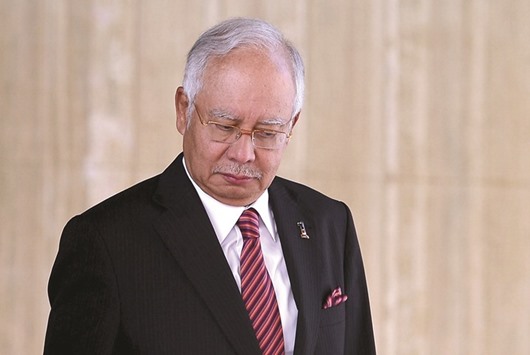Relatives of a Malaysian financier at the centre of the 1MDB fund scandal were dealt a setback in their efforts to claim assets seized by the US government when a federal judge denied a motion that would have given them time to try their luck in overseas courts.
Earlier this week four relatives of Low Taek Jho filed a motion to delay the December 12 hearing to January 23 so they could go to courts in New Zealand and the Cayman Islands to try and get real estate and other assets transferred to a new trustee.
In a one-sentence ruling, US District Judge Dale Fischer denied both the motion to postpone the hearing and a separate request to extend the deadline for filing a claim.
No reason was given in the filing, dated Wednesday.
Federal prosecutors had opposed the delay, noting in a filing on Wednesday that almost five months had transpired since the US Department of Justice launched a series of lawsuits alleging more than $3.5bn was misappropriated from the 1MDB fund.
Malaysian Prime Minister Najib Abdul Razak established the IMDB fund in 2009 and chaired the advisory board until recently.
Low Taek Jho – popularly known as Jho Low – is among the people named in civil lawsuits aimed at seizing $1bn in assets allegedly siphoned off from 1MDB and diverted into luxury real estate in New York, Beverly Hills and London, valuable paintings and a private jet.
Low Taek Jho’s relatives had wanted to try courts in New Zealand and the Cayman Islands, hoping those venues would be more hospitable to their requests.
The ruling to go ahead with the hearing tomorrow could thwart those plans.
The relatives’ lawyer, Daniel Zaheer of Kobre & Kim, did not immediately respond to a request for comment.
In addition to Low, the Department of Justice has named Riza Aziz in its lawsuits.
Aziz is the stepson of Najib, the Malaysian prime minister, and founder of Red Granite Pictures, which produced the 2013 Hollywood blockbuster The Wolf of Wall Street.
The lawsuits do not name Najib, but say more than $700mn of misappropriated funds flowed into the accounts of “Malaysian Official 1”, whom US and Malaysian officials have identified as Najib.
Najib has denied any wrongdoing and said Malaysia will co-operate in the international investigations.
Najib’s popularity dropped after he was linked to the scandal.
Tens of thousands marched on the streets in capital Kuala Lumpur last month, demanding that he step down and face corruption charges.
The prime minister has used security laws to block dissenters and his opponents.
Najib needs the support of the Islamist party PAS to secure a convincing win in the next elections.
The premier has put his weight behind an Islamic law, hudud, that sets out punishments such as amputation and stoning.
The law may be tabled in parliament next year.
“Quite clearly, there is a major domestic political dimension to this, as Najib positions himself as the champion of downtrodden Muslims in the region, which he and UMNO obviously believe will be popular in the Malay Muslim heartland,” said Phil Robertson, deputy director for the Asia Division of Human Rights Watch.

Najib: denies wrongdoing.
